Looking at nutrition labels can be confusing, as foods with high amounts of total fat won’t necessarily make you fat. Saturated fat and trans fat are two artery-clogging types that you should severely limit in your diet, but monounsaturated fats and polyunsaturated fats (with the latter including heart-healthy omega-3 fatty acids) are actually good for your health, as they may lower bad (or LDL) cholesterol levels and raise good (or HDL) cholesterol levels. To help you differentiate between the types, here are 12 high-fat foods you should avoid and 12 you should eat regularly.
Avoid: Baked desserts
Obviously, butter and oil have a lot of saturated fat, but when you’re not adding these ingredients yourself, it’s easy to overlook them. Baked desserts like cookies, cakes, and brownies almost always start with a base of butter or oil, so only eat them in moderation. (That being said, we still make sure to have dessert every single night.)
Avoid: Butter

Butter is often added to cooked and baked dishes before you even buy them, but we’re still adding a separate entry for butter because, unlike lard and shortening, it is often voluntarily added on top of things like bagels, toast, rolls, and pancakes. Although it tastes delicious, butter is one of the worst high-fat foods — a 2-tablespoon serving serves up a whopping 24 grams of fat, and a staggering 14 grams of that is saturated fat! (And sometimes it even includes some trans fat.)
Avoid: Candy
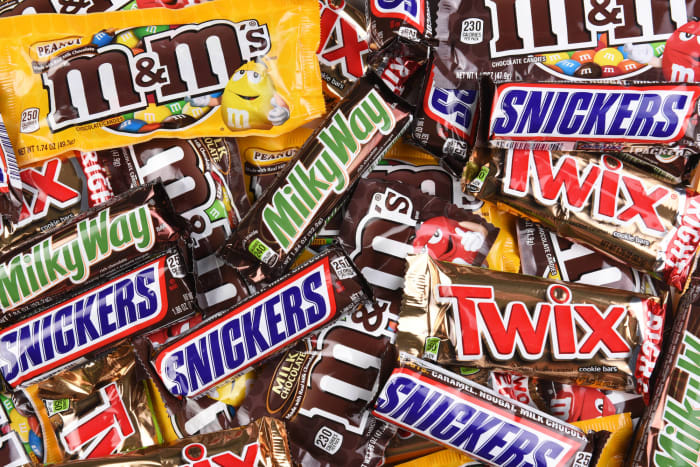
Candy is a calorie bomb and full of fat. Chocolate-based candies contain saturated fat from the cocoa butter and can add up quickly. A standard Snickers, Milky Way, or Hershey’s bar contains about 15 grams of fat, including 7 grams of saturated fat. That’s especially significant for a food that’s not very filling and offers no nutritional value.
Avoid: Chips

Potatoes don’t have a lot of fat, but the oils used to process potato chips do. And unfortunately, it adds up to way too much saturated fat — especially when you eat chips by the fistful. If you’re going to munch on potato chips, look for ones cooked in canola oil or olive oil…or make them yourself at home!
Avoid: Deep-fried foods

Once again, it’s the oil that’ll get you. Chicken, potatoes, onions, and numerous other foods are healthy by themselves, but once you deep-fry them in oils packed with saturated and trans fats, it’s a different game. And sorry to be the bearer of bad news, but Twinkies, Oreos, and Snickers are unhealthy even before they get deep-fried at fairs.
Avoid: Fast food

Fast food is just a poor choice all around. In addition to being loaded with saturated fats and even some trans fats (due to all the cooking oil), fast food is ultra-processed, preservative-packed, saturated with sodium, and chock full of calories. And save for fruits and veggies, this applies to nearly everything on the menus — from chicken, burgers, and fish to fries, tots, and onion rings.
Avoid: Fatty meats

Meats can pick up fat during preparation, but many are fatty from the start. Pork belly, bacon, sausage, ribs, cured meats, and even some cuts of steak can add a lot of fat to your plate. For example, a 3-ounce serving of pork belly has a whopping 45 grams of total fat that includes 15 grams of artery-clogging saturated fat.
Avoid: Frostings & icings

It’s difficult to find a frosting or icing that doesn’t contain heavy cream, cream cheese, milk, butter, lard, and/or shortening — all of which are high in fat, specifically saturated fats and sometimes trans fat. Spread it on thin, or try a recipe that uses nonfat Greek yogurt as the base.
Avoid: Heavy cream

As we mentioned in the frosting/icing section, heavy cream is a fatty ingredient that should be consumed in moderation due to the high amount of saturated fat. It’s included in obvious things like whipped cream and ice cream, but heavy cream is also added to soups, sauces for pasta and vegetable dishes, biscuits, coffee, and other hot drinks.
Avoid: Pastries
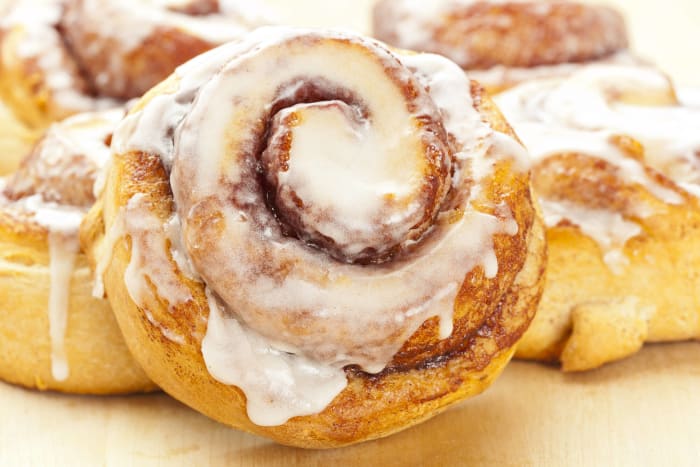
Like dessert, breakfast can be a tricky meal to navigate when avoiding fatty foods. The worst offenders might be pastries and other baked goods — including everything from donuts, muffins, and danishes to cinnamon buns, fritters, and scones — due to the butter, oil, and other fats used to make the dough, icing, chocolate, and fillings.
Avoid: Pizza

Pizza isn’t inherently bad—Italians eat it regularly, after all. But pizza in Italy is usually made with from-scratch dough, fresh tomatoes, a few dollops of cheese, and maybe some sparse toppings. Pizza in America often contains much more crust, a thick layer of cheese (which is sometimes cheese-stuffed), and numerous oily toppings. And when it’s not fresh, it’s also loaded with sodium and preservatives. A single serving of DiGiorno Three Meat Frozen Pizza with Cheese Stuffed Crust contains 9 grams of saturated fat!
Avoid: Salad dressings

A mixture of fresh produce is one of the healthiest things you can eat, but a salad can become fortified with unhealthy fat depending on the dressings you use. Creamy dressings like blue cheese, Caesar, and ranch are egregious offenders, with French, Italian, and Russian dressings all secretly hiding saturated fat, too. Your best bet is an olive oil-based vinaigrette or simply combining olive oil and vinegar to make your own dressing.
Eat: Avocados

Avocados don’t usually have nutrition labels, but if they did, you’d see that a medium avocado has about 23 grams of total fat. However, that only includes 3 grams of saturated fat (or about 1.5 grams per serving) and no trans fat, while boasting 15 grams of monounsaturated fat and 3 grams of polyunsaturated fat.
Eat: Cheese

Cheese should absolutely be eaten in moderation, but it does have some health benefits like high levels of protein, calcium, vitamin D, B-vitamins, and healthy fats. Specifically, high-fat cheeses like blue, brie, cheddar, and cottage contain conjugated linoleic acid (CLA), a healthy fat that reduces inflammation and may prevent obesity, heart disease, and certain cancers.
Eat: Chia seeds

Chia seeds don’t have much of a taste, but they are often included in healthy recipes because of their generous servings of protein, fiber, and healthy fats. (One small serving contains 9 grams of fat!) This includes alpha-linolenic acid, an omega-3 fatty acid that regulates blood pressure and prevents heart disease by maintaining the organ’s rhythm and pumping.
Eat: Dark chocolate

A one-ounce serving of dark chocolate contains a startling 12 grams of total fat, but don’t deny your sweet tooth just yet. Dark chocolate boasts some beneficial fats, including oleic acid, a monounsaturated heart-healthy fat that you’ll also find in olive oil. Additionally, it contains flavanols and polyphenols, which are compounds with antioxidant properties.
Eat: Eggs

Each egg contains about 5 grams of fat, but only 1.5 grams of that is saturated fat. The rest is composed of polyunsaturated and monounsaturated fats. If you’re truly worried about your total fat intake, stick with egg whites — the yolk contains most of the fat, so the whites are virtually fat-free.
Eat: Fish
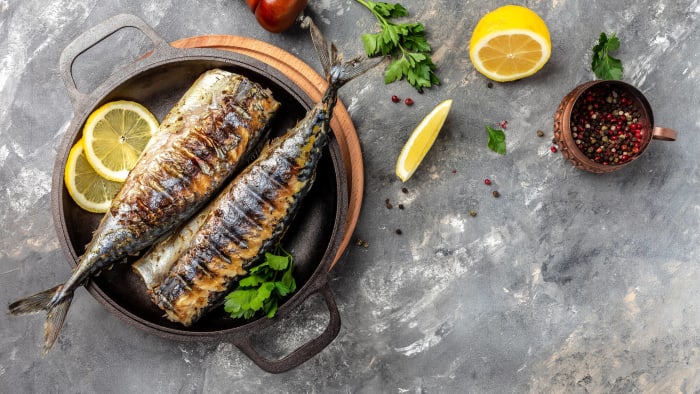
The term “fatty fish” sounds frightening, but fish are actually loaded with heart-healthy omega-3 fatty acids and should absolutely be part of your diet. Not all fish are created equal, so if you’re aiming to increase your omegas, focus on anchovies, herring, mackerel, salmon, sardines, tuna, and trout.
Eat: Flaxseed

Flaxseeds are mostly fat — 67% fat, to be exact. For a one-ounce serving, that shakes out to 12 grams of fat, which is a slightly deceiving figure. Only a single gram of that is saturated fat and there are no trans fats in flaxseed either, which is why it’s touted as being beneficial to your health.
Eat: Nuts

Nearly every type of nut is considered healthy, but they also all contain high amounts of fat. While saturated fat can clog your arteries, the monounsaturated and polyunsaturated fats found in nuts can lower your cholesterol and promote heart health. Don’t go totally nuts on nuts — eat them in moderation and focus on almonds, hazelnuts, macadamias, pecans, and walnuts.
Eat: Nut butters

Nuts contain healthy fats and the same thing is true of nut butters, whether it’s almond butter, cashew butter, or peanut butter. Just be sure to get the natural kind that only contains nuts and salt—otherwise, you’ll also be consuming saturated fat-filled hydrogenated oils, as well as sugar and preservatives.
Eat: Olive oil
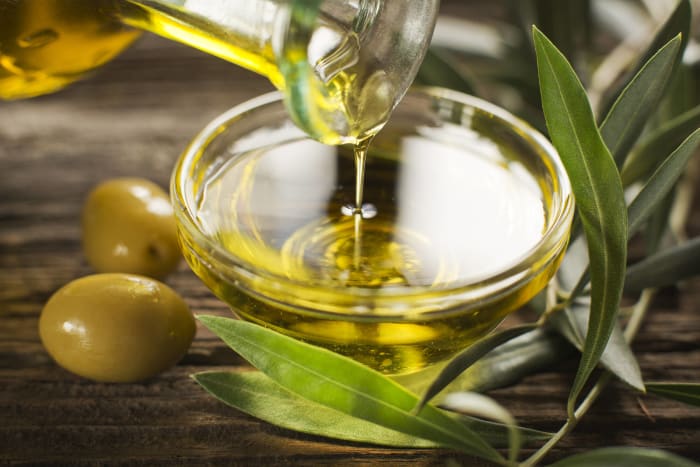
When people think of healthy fats, olive oil is often the first thing to come to mind thanks to the high levels of monounsaturated fats. (In fact, we’ve already mentioned it in this article.) Many nutritionists suggest eating olive oil daily — often as part of the Mediterranean diet — and the World Health Organization actually recommends four tablespoons a day! For the record, extra virgin olive oil is the least processed and considered the healthiest variety.
Eat: Tofu

Tofu has long been touted as a healthy food. It’s a solid substitute for meat, a strong source of protein, and relatively low in calories. However, it’s high in fat, with about 11 grams per half-cup serving. Thankfully, most of that fat is of the polyunsaturated variety.
Eat: Yogurt
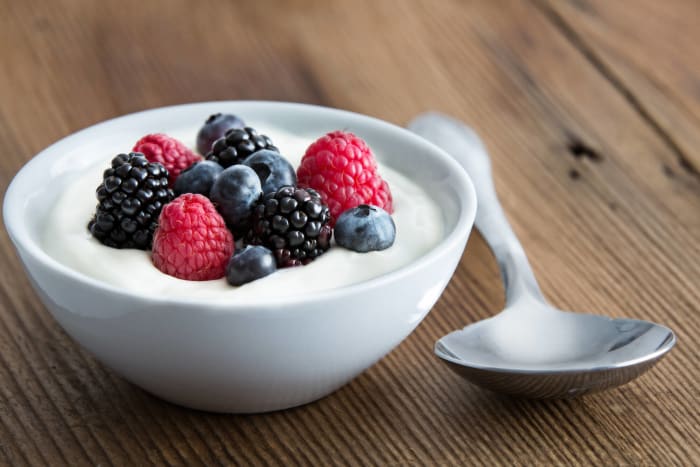
Fat-free yogurt (and Greek yogurt) is a better option if you’re looking to lose weight, but don’t fret too much over the full-fat versions, as some of that includes heart-healthy monounsaturated fat. There’s also some saturated fat in there, so keep your yogurt intake in moderation. Or split the difference with a low-fat version, which contains fewer than 4 grams of fat per 8-ounce serving.
No comments:
Post a Comment